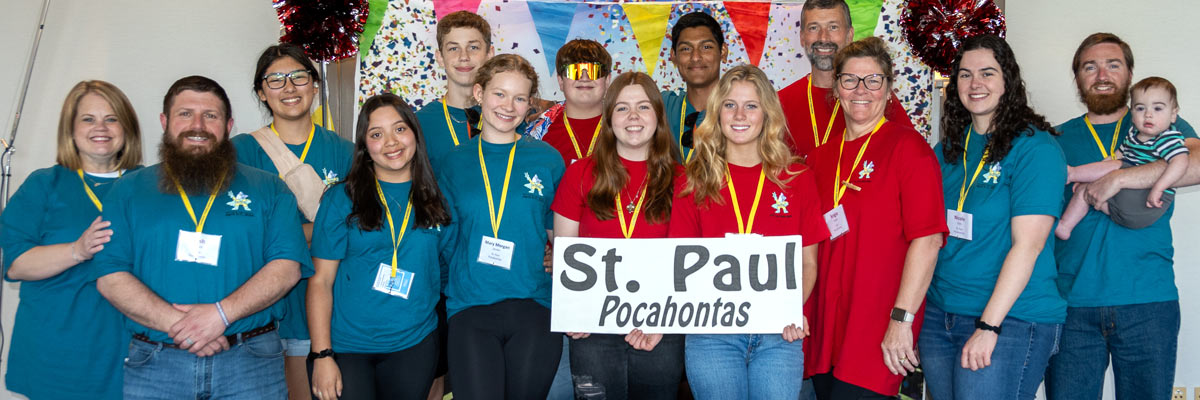Official Website of the
Catholic Diocese of Little Rock
Mass with Brothers and Sisters of Charity 2021
Published: October 2, 2021
Bishop Anthony B. Taylor preached the following homily at Little Portion Hermitage in Berryville on Saturday, Oct. 2, 2021. The readings used were from the 27th Sunday in Ordinary Time, Year B.

Bishop Taylor
“The Joy of the Lord is my Strength.” That is the theme for this gathering of the Brothers and Sisters of Charity, an annual gathering, which always takes place on the weekend closest to the feast of St. Francis of Assisi, who is one of the patrons of your community. This year our gathering takes place in a year of pandemic when we are more aware of our weakness and vulnerability than we are of strength.
And we are gathering on a much smaller scale than usual this year in which we have all suffered losses, and yet still we speak of our joy in the Lord. Our gathering this year takes place on a weekend when in the Gospel Jesus gives us a very challenging teaching on the decidedly non-joyful topic of divorce, and yet even here the joy of the Lord is our strength.
Here Jesus’ overriding concern is not only the sanctity, and thus joy of marriage, but also his desire to protect women and strengthen their position in society. In this regard two things stand out:
Jesus understands marriage to be not a contract but rather a covenant, like the unbreakable covenant between God and his people. And it is the will of God from the beginning of creation that in marriage the two become one flesh, such that there are no longer two parties; nothing to separate.
1.) Marriage as a covenant — The Pharisees’ concept of marriage is that it is a contract between two parties, and in practical terms in those days of arranged marriage, a contract between two families. And being a contract, it could be terminated for breech of contract. The only issue in Jesus’ day was under what conditions. But Jesus answers by shifting the focus from divorce to marriage and focusing on the intent of God from the beginning of creation — God who only wants our happiness and welfare.
Jesus understands marriage to be not a contract but rather a covenant, like the unbreakable covenant between God and his people. And it is the will of God from the beginning of creation that in marriage the two become one flesh, such that there are no longer two parties; nothing to separate.
Jesus’ elimination of the possibility of divorce in most circumstances — so long as the marriage was valid (that’s the exception where annulments come in) is actually very freeing, and so a source of joy and strength in the Lord. After all, isn’t it true that in today’s world every couple that gets married knows that divorce is legal in our country and so always a possibility?
Indeed, not merely a remote possibility. Most people marrying today come from homes where divorce is a reality, at least in the extended family. This constitutes a distant cloud hovering over every wedding. And the same was true in Jesus’s time. Jesus wants to remove that cloud by reaffirming God’s will that marriage be a covenant, not just a contract, a sacrament in which two persons become inseparably one, a union marked by joy in the Lord their strength.
2.) But Jesus is not only concerned with the indissolubility of marriage as a theological concept. He is also concerned to protect women from exploitation. In Jewish law a man could divorce his wife, but a woman could not divorce her husband — in Greco-Roman law as reflected in Mark’s version of this story they could — but in Jewish practice only a man could initiate a divorce. Women had no recourse, even in situations of domestic violence.
The only debate at the time was whether a man could divorce his wife “for any reason whatsoever” — anything that displeases him? She burns the toast and she’s toast? Or she’s not as pretty as she once was, and he wants an upgrade? Or did there have to be a serious reason, mainly adultery?
Jesus says not even for that. He wants mercy. He knows the usual fate of discarded ex-wives in those days and it wasn’t pretty. So Jesus’ teaching about divorce is intended to protect women, and thus in that way a source of joy and strength in the Lord.
I know that in our gathering today we will have a number of receptions and professions, which is of course one more reason for us to rejoice in the presence of the Lord in our midst.
And I know that most of you are married, so hopefully our celebration today will serve to deepen your joy and strengthen your marital covenant with each other and with the Lord, who truly is our strength.









